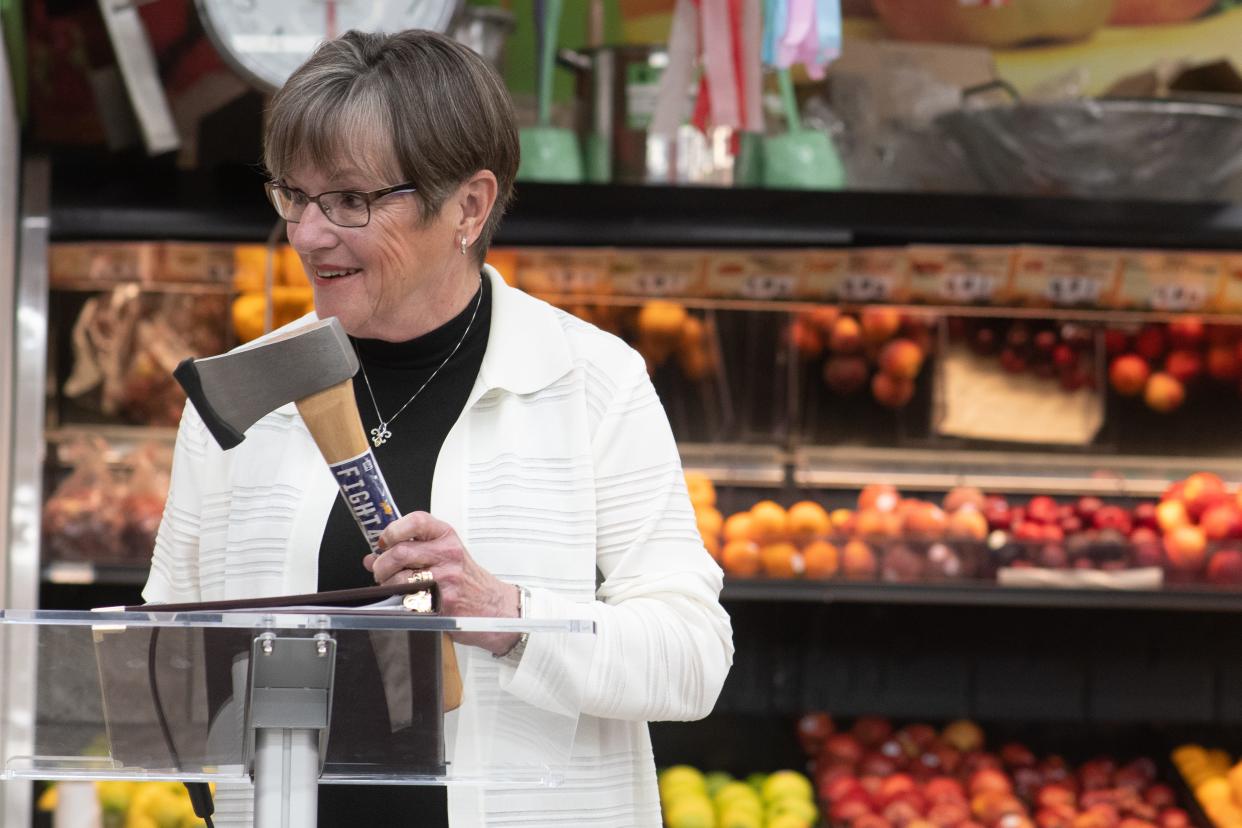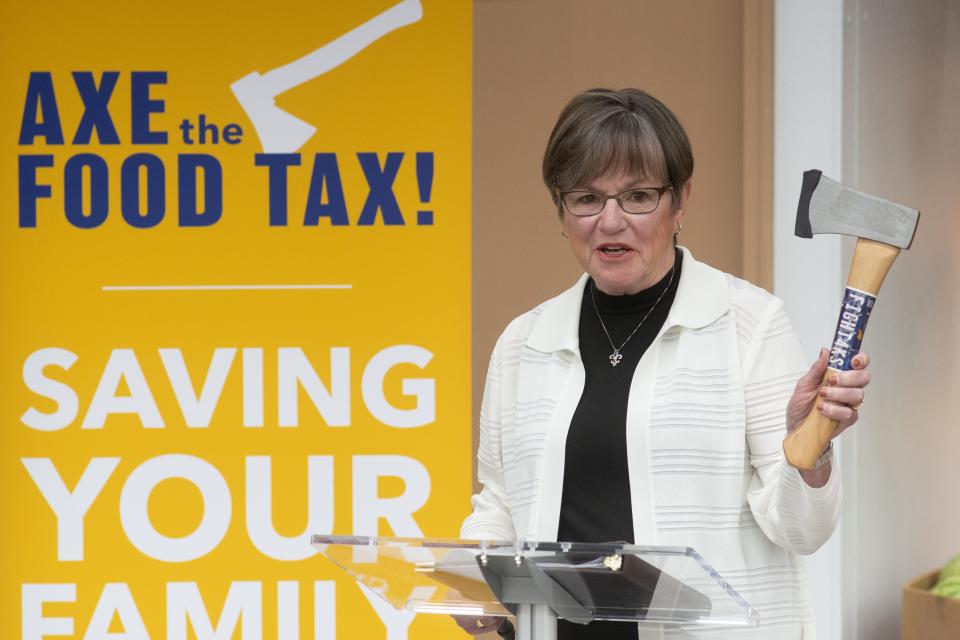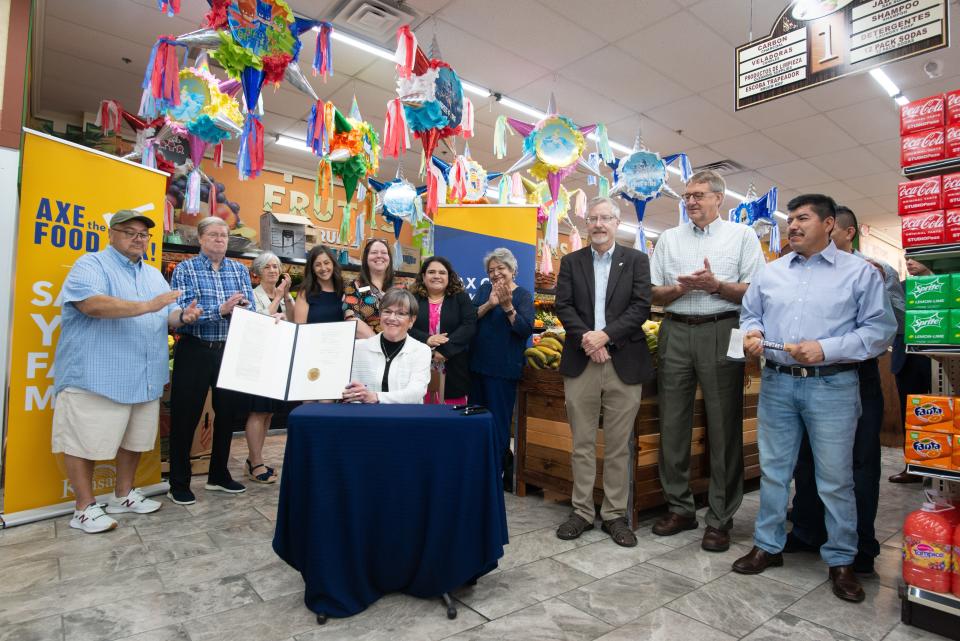Kansas governor signs bill cutting food sales tax a fourth time. GOP objects to 'campaign stops'
- Oops!Something went wrong.Please try again later.

Wielding an axe as a mariachi band serenaded a Hispanic grocery store in Topeka, Gov. Laura Kelly signed the food sales tax bill — for the fourth time.
Tax cuts have emerged as a key plank of Kelly's campaign strategy at the same time as her official office held seven separate ceremonies across four cities to celebrate passing legislation.
"It's a campaign stop for her," said House Majority Leader Dan Hawkins, R-Wichita.
Kelly defends the use of state resources for multiple ceremonial bill signings of the same legislation.
"It's important that we get this message out to the people in the state of Kansas so that they know relief is on its way," Kelly told the Capital-Journal after the latest bill signing. "And reassure them that we made promises, that we kept our promises. I think it's important for people in Kansas to be able to trust their leadership."
More: Why are Joe Biden and Sam Brownback in the Kansas governor's race? They're unpopular, for one
A governor's office news release characterized it as a "statewide tour celebrating the 'Axe the Food Tax' legislation."
"She’s hijacked what should be a legitimate means of informing Kansans and turned it into a taxpayer-funded vanity tour across the state," said Joanna Rodriquez, a spokesperson for the Republican Governors Association.
Ceremonies are common, but not doing them multiple times
Ceremonial signings of bills, proclamations and other government documents are common in state politics. Sometimes, governors take to the road to hold the ceremony in an affected community.
"A singular signing ceremony also provides a legitimate public service by informing taxpayers of a new law and giving media an opportunity to ask questions about its implementation or impact on the state," Rodriquez said.
What's not common is signing the documents multiple times.
"I don't recall another Kansas governor having multiple signing ceremonies for the same bill, but it's actually a genius idea in terms of political strategy," said Washburn University political science professor Bob Beatty.
"The governor is doing her job, spreading the word in different areas of the state about the legislature and governor coming together to cut taxes — which indeed is incredibly popular. And yes, it's certainly a plus for her to be doing this in an election year."
More: Controversial state senator Dennis Pyle announces run for Kansas governor as an independent
Not all Republicans took exception to Kelly's ceremonies.
"Hey, it's an election year," said Senate President Ty Masterson, R-Andover. "I'd be signing it probably that many times myself. I'm not going to be critical of her because it's an election year."
The food sales tax cut has been a key piece of Kelly's reelection strategy, despite disappointment among fellow Democrats that the legislation doesn't eliminate the tax this summer.
Still, Beatty said, everyone has reason to celebrate over the tax cuts.
"It's the American way for an incumbent to benefit from doing their job," he said. "The response from incumbents always will be, they certainly take the heat when things aren't going well, so they're happy to celebrate something good and get some credit."
Governor's office won't say how much signing events cost
The bill, HB 2106, was drafted by GOP leaders as Republicans legislators rejected the Democrat plan. The Republican-authored legislation gradually cuts the state sales tax rate on groceries to 0%, but waits until after Election Day for the first installment and until 2025 for a full elimination.
Kelly didn't publicly back the GOP bill until after it passed the Legislature. She was not publicly involved in the negotiations that produced the legislation. Even after signing it, Kelly pressed lawmakers for a bigger tax cut sooner.
"I would prefer that it take effect tomorrow, and I will continue to urge the Legislature to move up the start date, but the important thing is that we got the tax cut done," Kelly said.
More: 'A nothingburger': Kansas ethics commission finds Republican complaint sufficient — then tosses it
Republicans modeled the gradual reduction in-part on a formulaic draw-down that Kelly rejected when she vetoed a bigger bundle of tax cuts three years ago.
"Kelly and her staff have repeatedly made it clear they have absolutely no concern with misusing state resources and powers to try and salvage her political career," Rodriquez said. "Kelly made Kansans pay a higher grocery tax for three years when she vetoed the first reduction, and now that she’s finally signed a bill to reduce their grocery taxes, she’s going to make them pay for the vanity celebration tour she’s throwing herself for finally doing the right thing."

It is unclear how much taxpayer money was used for ceremonial bill signings.
In response to a Kansas Open Records Act request, the chief counsel for the governor's office said there are no records with costs broken down by specific events. Determining expenses would require research and calculations, which government officials aren't required to do under the law. He directed inquiries on security costs to the Kansas Highway Patrol.
The axe used by Kelly in the ceremonial food sales tax cut signings didn't cost taxpayers, apparently because it was loaned by a staffer. The backdrops used by the governor's office to promote the tax cut cost about $800, FedEx receipts show.
"It's politics, sure it is," Masterson said. "I'm not saying it's not a waste of resources."
Multiple signing ceremonies celebrate two tax bills
The two best-known tax bills from the 2022 session have had at least seven combined signing ceremonies.
For HB 2239, a bundle of 29 separate tax bills, Kelly ceremonially signed it May 4 outside a Topeka home to highlight a property tax cut. She ceremonially signed it again May 23 at the Statehouse to highlight tax relief on agricultural fencing, particularly for farmers and ranchers affected by wildfires.
Kelly signed the bill again on Wednesday. The ceremony was in Wichita, joining the local chamber of commerce and the Kansas Department of Commerce to celebrate an aviation industry tax cut.
Republican legislators attended at least two of those ceremonies. Masterson was at the most recent signing in Wichita, which highlighted tax cuts benefiting the aviation industry. But that didn't stop him from joking about the number of events.
"How many times can you sign the same thing?" he said with a laugh.
The food sales tax cut, HB 2106, had a ceremonial signing at an Olathe grocery store on May 11. Kelly then traveled to a Wichita food distribution center on June 4 for another ceremonial signing. On June 10, she signed the bill for a third time at a Price Chopper grocery store in Kansas City before a fourth signing on June 13 in Topeka.
Spokespeople for House and Senate GOP leadership didn't respond to whether they were invited to those ceremonies.
An additional tax cut bill, HB 2136, had a single signing ceremony. The downtown Topeka event highlighted the $50 million in federal COVID aid going to small retail businesses.
Ceremonies resurface in TV ads

Television news reports of some of the ceremonial bill signings were subsequently used in campaign ads.
Kelly's campaign pulled news clips from one food sales tax ceremony, then a Democratic Governors Association ad relied heavily on television newscasts of the bigger tax bundle.
Beatty, who studies political ads, said using news reports in commercials can add to the legitimacy of the claims and lead to the viewer to taking in the information in a less partisan way.
"In Laura Kelly's case, this is even more important because for her to win she needs the votes of a fair number of moderate Republicans, meaning they'll have to cross party lines to vote for her," Beatty said. "To do that, they will need to feel that she is governing in a bipartisan way, and showing news clips of her signing bipartisan legislation is a way to get that message across from a neutral source."
More: Derek Schmidt's running mate in challenge to Kansas Gov. Laura Kelly is a Roger Marshall staffer
Jason Tidd is a statehouse reporter for the Topeka Capital-Journal. He can be reached by email at jtidd@gannett.com. Follow him on Twitter @Jason_Tidd.
This article originally appeared on Topeka Capital-Journal: Kansas Gov. Laura Kelly's office campaigns on food sales tax cut

